Key takeaways:
- Self-regulation in marketing emphasizes authenticity, adaptability, and accountability, helping professionals stay true to brand values amidst market fluctuations.
- Implementing structured strategies like clear boundaries, regular check-ins, and celebrating small wins enhances focus and fosters a positive marketing environment.
- Continuous improvement through reflection, seeking external feedback, and setting incremental goals cultivates a mindset of growth and sustained motivation.
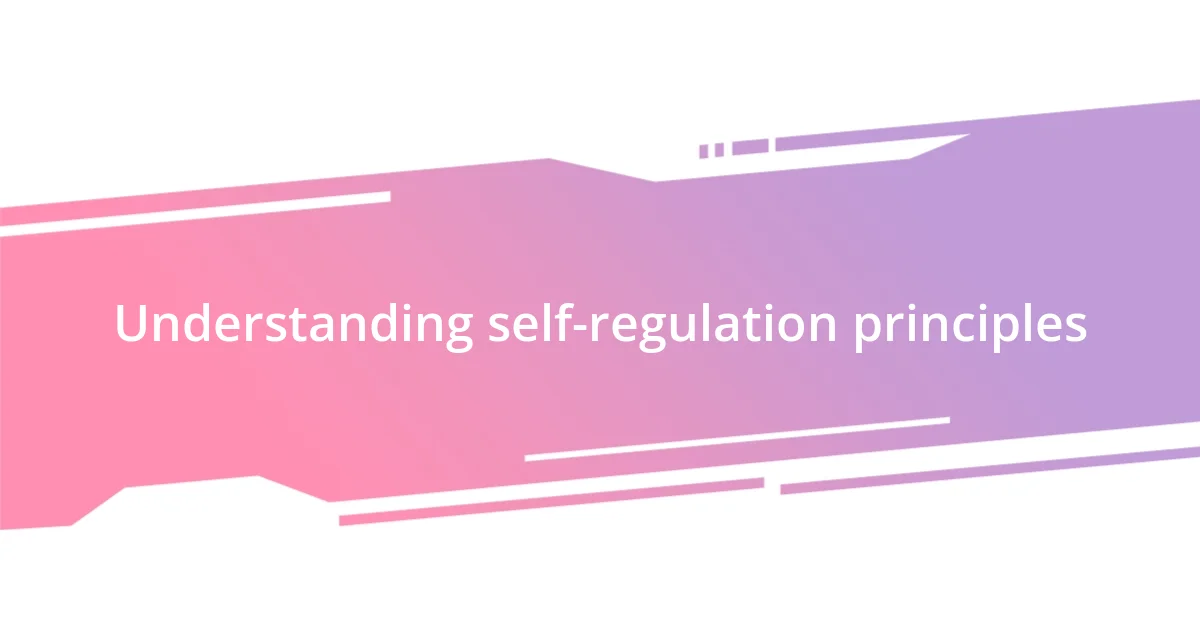
Understanding self-regulation principles
Self-regulation in marketing is all about recognizing the triggers that influence our decisions and behaviors. I recall a time when I was knee-deep in planning a campaign, only to realize I was getting swept away by the latest trends instead of focusing on the brand’s core values. Have you ever found yourself in a similar situation, chasing shiny objects rather than sticking to your original strategy?
The principles of self-regulation involve setting clear goals and maintaining discipline. I remember setting specific, measurable objectives for a project, which really helped me stay on track. Each time I met a goal, it felt like a personal victory, reinforcing my motivation. Does goal-setting resonate with you in your own marketing journeys?
Another crucial aspect is the ability to reflect on outcomes. After a marketing initiative, I always take a moment to analyze what worked and what didn’t. It’s often hard to confront failures or misjudgments, but this reflection process is where I’ve gained the most valuable insights. How do you handle your project evaluations?
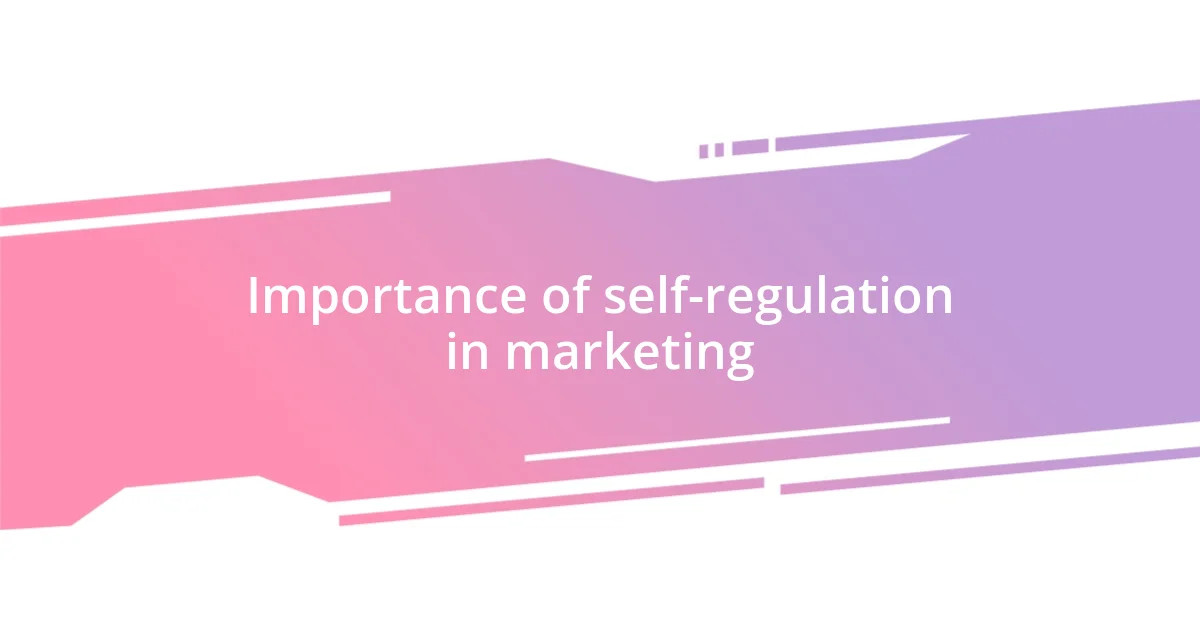
Importance of self-regulation in marketing
Self-regulation in marketing is crucial because it helps us maintain authenticity. For instance, I once launched a campaign that gravitated towards viral trends, but it didn’t align with the brand’s identity. The backlash was an eye-opener for me. It reinforced that self-regulation is not just about achieving results but also about ensuring those results reflect the essence of the brand. Can you relate to that moment when you realized the importance of staying true to your values?
Moreover, self-regulation fosters adaptability in an ever-changing market landscape. In a campaign where I had to pivot strategies very quickly due to unexpected market shifts, I was grateful that I had established a strong framework of self-regulation beforehand. This foundation allowed me to make informed decisions rather than reactive ones. Have you ever felt overwhelmed by rapid changes and found it hard to adapt your marketing strategy?
Ultimately, the practice of self-regulation nurtures a sense of accountability. I’ve experienced this firsthand when collaborating with a team; keeping each other accountable meant we were more proactive in addressing challenges together. It built trust within the group, making our efforts more cohesive. Doesn’t it feel great when the team works harmoniously toward a common goal?
| Aspect | Example |
|---|---|
| Authenticity | Maintaining the essence of a brand over chasing trends. |
| Adaptability | Adjusting strategies based on market changes while staying focused. |
| Accountability | Building trust within teams for better collaboration. |
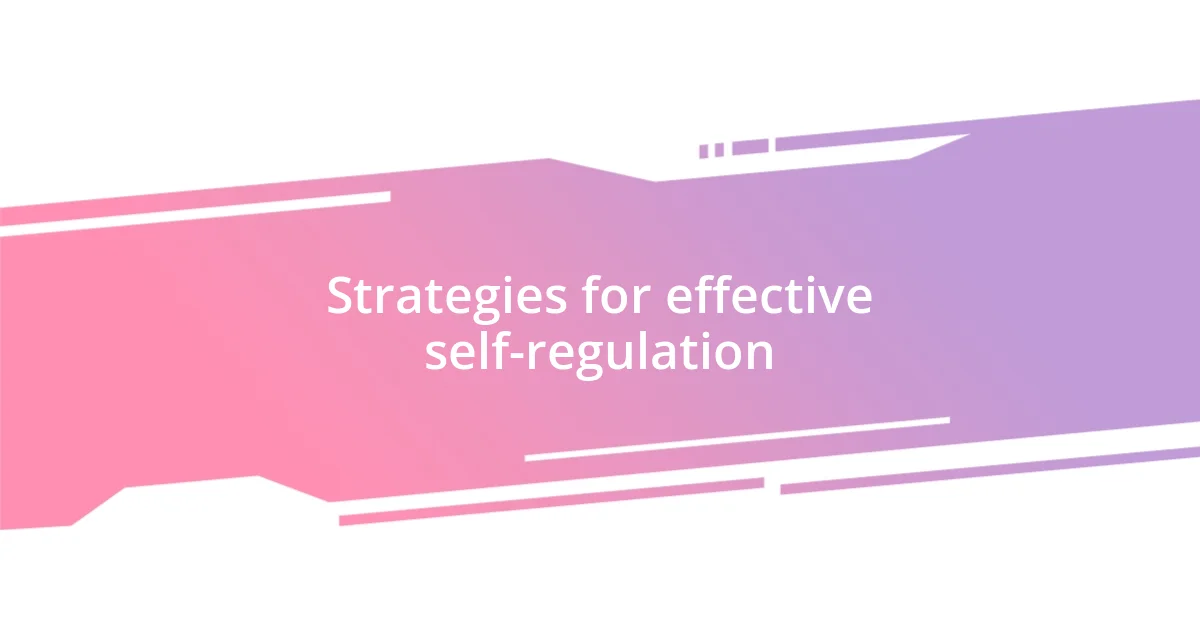
Strategies for effective self-regulation
Effective self-regulation involves creating structured strategies that help keep our marketing efforts aligned with our goals. One method I’ve found particularly beneficial is developing a detailed action plan for each campaign. This not only keeps me organized but also helps me anticipate potential distractions. I recall a project where I meticulously outlined each step, ensuring I’d focus on our core messages. That clarity let me navigate through the chaos of creative brainstorming sessions without losing sight of our objectives.
Here are some strategies I’ve employed for effective self-regulation:
- Set Clear Boundaries: Define specific times for brainstorming versus executing your plan to prevent overlap.
- Regular Check-Ins: Schedule periodic reviews to assess progress and adjust strategies as necessary.
- Practice Mindfulness: Take moments to pause and reflect on your emotional responses during decision-making—it helped ground my choices.
- Accountability Partners: Team up with a colleague who can provide insights and hold you accountable to your goals.
- Celebrate Small Wins: Acknowledge even minor achievements to maintain motivation and reinforce positive behavior.
In my experience, these strategies not only enhance focus but also foster a sense of fulfillment throughout the marketing process.
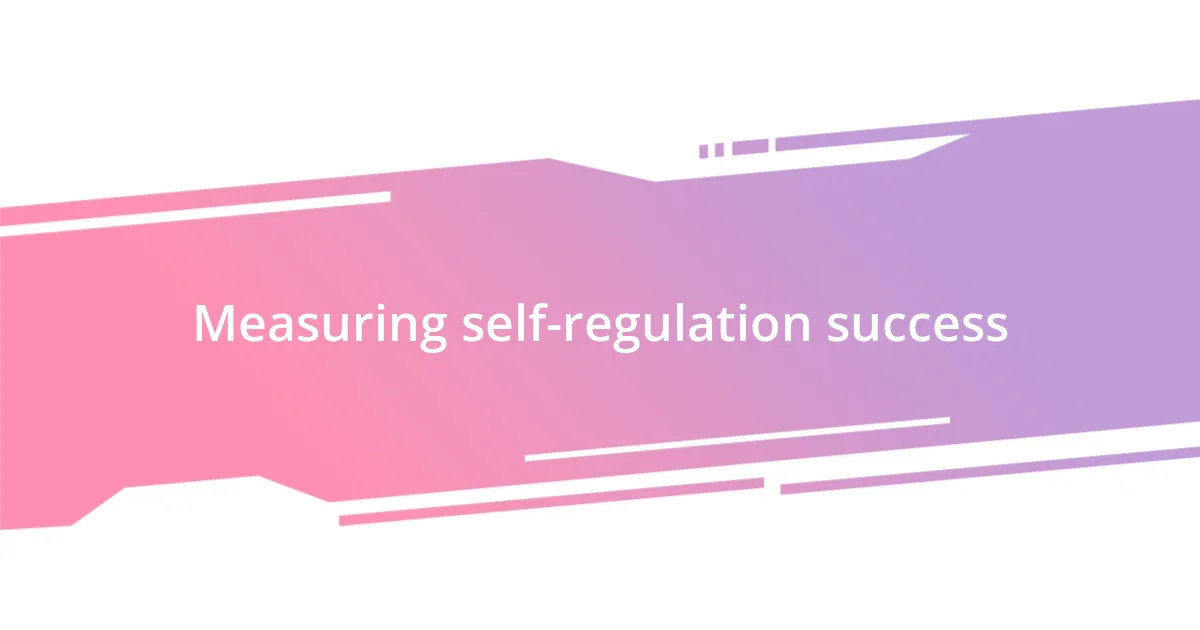
Measuring self-regulation success
Measuring self-regulation success can often feel like a nuanced dance. I remember a time when I was trying to assess the effectiveness of a marketing campaign. I set measurable goals, such as engagement rates and conversion metrics, but I also dug deeper to understand if the messaging truly resonated with our audience—how did it make them feel? This holistic approach allowed me to gauge success beyond just numbers. Have you ever considered how emotional responses play into your measurements?
In another instance, I implemented a feedback loop, which was a game-changer. After each campaign, I invited team members to share their insights on what worked and what felt genuine to our brand. I found that these discussions not only highlighted various perspectives but also guided our future strategies. It turned the often-sterile metrics into a conversation about values and authenticity—wasn’t that invigorating?
Lastly, I learned that success isn’t solely determined by outcomes; it’s about maintaining alignment with personal and brand values throughout the process. I like to keep a reflective journal where I jot down my thoughts about each campaign. This practice helps me see if I’m straying from our core ideals and aids in measuring success through a lens of integrity. Have you thought about how self-reflection could enhance your own evaluation practices?
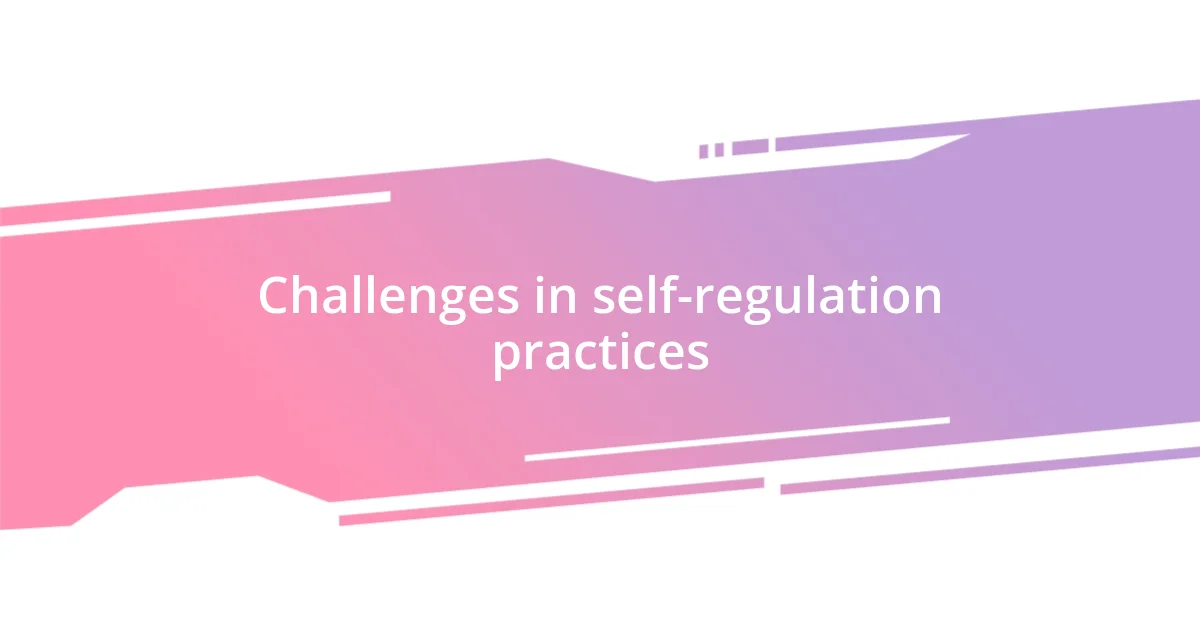
Challenges in self-regulation practices
Navigating the challenges of self-regulation in marketing can sometimes feel like trying to steer a ship through a storm. I recall a particularly hectic period during a major product launch when competing priorities seemed to pull me in every direction. Despite my best laid plans, unexpected demands crept in, making it difficult to adhere to my checkpoints. Have you ever felt overwhelmed by shifting priorities? It’s a common struggle that can easily derail your focus if you’re not vigilant.
Consistency is another hurdle I encountered along the way. For instance, I remember starting off strong with my check-in schedules, but as time passed, distractions crept in—reminders became easy to overlook. I began to question whether I was truly holding myself accountable or simply going through the motions. It’s a stark reminder: without steadfast commitment, even the best strategies can falter. How do you keep yourself anchored when the waves of distraction hit?
Lastly, the emotional toll can’t be overlooked. I’ve found that maintaining self-regulation often clashes with my intrinsic desire for creativity and spontaneity. One project in particular saw sparks of brilliance arise unexpectedly, but sticking to my outlined strategy felt stifling at times. Isn’t it interesting how the pressure to stay disciplined can stifle those creative instincts? Balancing the structure of self-regulation with the freedom to innovate is delicate, yet finding that equilibrium is essential for true success.

Real-life case studies
I once came across a marketing team that excelled at self-regulation through real-life case studies. They prioritized documenting each campaign, noting not only what strategies they executed but also how they felt during the process. For example, during a product teaser campaign, someone shared that their uncertainty regarding the audience’s reaction affected their enthusiasm, which was reflected in their work. Have you ever considered how personal feelings can shape the overall success of a campaign?
Another case showed a brand reevaluating its approach after a lackluster response to a promotional effort. The team held a retrospective meeting where they shared candid feedback and discovered that their messaging had veered too far from their original brand voice. This revelation sparked a reinvigorating creativity in their subsequent campaigns, connecting them deeply with their audience’s values. Have you thought about the power of revisiting past efforts to reignite inspiration?
In a completely different scenario, I studied a tech startup that implemented self-regulation by actively tracking their audience’s feedback in real-time. They used social media analytics to gauge emotional responses to their ads, interpreting the data not just as numbers but as expressions of audience sentiment. This adaptive strategy helped them pivot quickly when an ad didn’t resonate, showcasing how dynamic self-regulation can lead to innovative solutions. Isn’t it fascinating how data can create a more profound understanding of customer relationships?

Tips for continuous improvement
When aiming for continuous improvement in self-regulation, I’ve found that regular reflection is invaluable. After each project, I set aside some time to meditate on what worked and what didn’t. This process often reveals insights I hadn’t considered in the heat of the moment—like a moment during a campaign launch when I realized my stress was inhibiting team creativity. Have you ever found clarity in unexpected places?
One effective tactic I’ve adopted is seeking external feedback. I remember reaching out to a mentor after a particularly grueling marketing push, and their perspective illuminated blind spots I hadn’t acknowledged. They encouraged me to embrace constructive criticism, which ultimately transformed my approach. Have you thought about who in your network could provide a fresh viewpoint that might spark new ideas?
Finally, setting incremental goals has been a game changer for me. Instead of overwhelming myself with one massive target, breaking it down into smaller, achievable milestones has kept me motivated. For example, aiming for weekly progress rather than waiting for a grand finish allowed me to celebrate small victories along the way. How do you celebrate your achievements without waiting for the big moment? Finding joy in the journey is essential for sustaining motivation and enhancing self-regulation.













